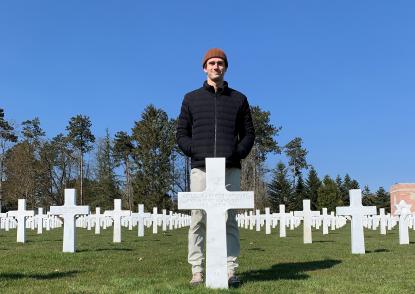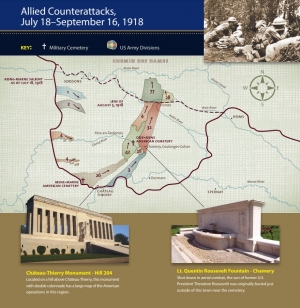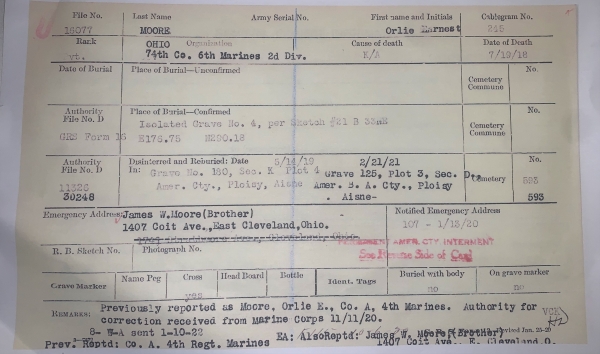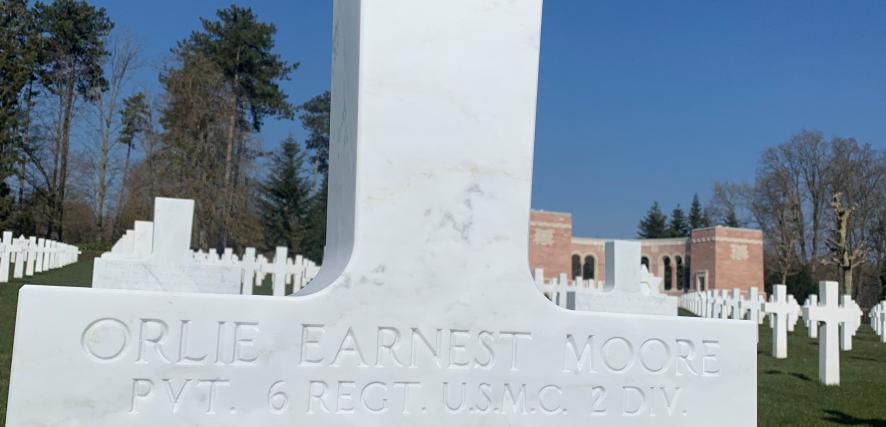
When JCU senior Michael FitzGerald traveled to France over spring break, he completed a generations-long quest to find the gravestone of his great, great, great uncle.
Since he was a boy, Michael heard stories about Orlie Earnest Moore, a Second Division Marine that was killed in action during World War I. While Michael would never meet Orlie, he has always felt like he knew what kind of man Orlie was. Orlie was born in Cleveland on December 28th, 1898, and at just 19 years old he was sent off to fight the German forces invading France during the first World War. Orlie was one of the Second Division Marines fighting a counterattack to protect Paris near the town of Vierzy when he was killed in action on July 19th, 1918. To Michael, Orlie’s story symbolizes bravery, adventure, and sacrifice; which is why his name is still carried on within Michael’s family to this day.
A few months ago, Michael learned of an opportunity to travel to France over spring break. When Michael told his family, they were ecstatic. Almost as soon as Michael told his "Gramps" about his spring break trip, he knew he would somehow find a way to visit Orlie’s grave. He began researching, and was able to locate the correct cemetery, plot number, and some general directions on how to get there.
Fast forward a few months and Michael, after meticulous planning and a safe arrival in France, was ready to embark on his journey to Orlie's grave. After a couple of hours traveling through the French countryside, Michael arrived at Oise-Aisne American Cemetery, in Seringes-et-Nesles, France.
Upon arrival, Michael stood among hundreds of white crosses lining the grass. Respectfully, he made his way to the grave of the man who inspired bravery and perseverance for four generations of the Moore family. As he walked, all was quiet except for the sound of birds chirping in the soft wind. At the precise moment he reached Orlie’s grave, bells began to ring, cutting through the silence, almost as if Orlie himself was welcoming Michael. Michael felt called to be the first of his family to visit Orlie in his final resting place. In this moment, Michael recounts feeling a sense of clarity, closure, and a powerful sense of connection with the past.
After over 100 years of waiting, Michael had at last met his great, great, great uncle. Michael could almost sense the gratitude from Orlie that, finally, his family had come to visit.
Although it was 6:00 AM in Cleveland, Michael FaceTimed his grandfather to show him Orlie's resting place. Together, they shared a prayer with Orlie over the phone, and chatted for a bit about how powerful this moment was for their family. His grandfather had heartwarming words for Michael saying, “Michael, my father thanks you, my grandfather thanks you, I thank you. I’m sure Orlie Earnest Moore thanks you, you’re a great soul.”


